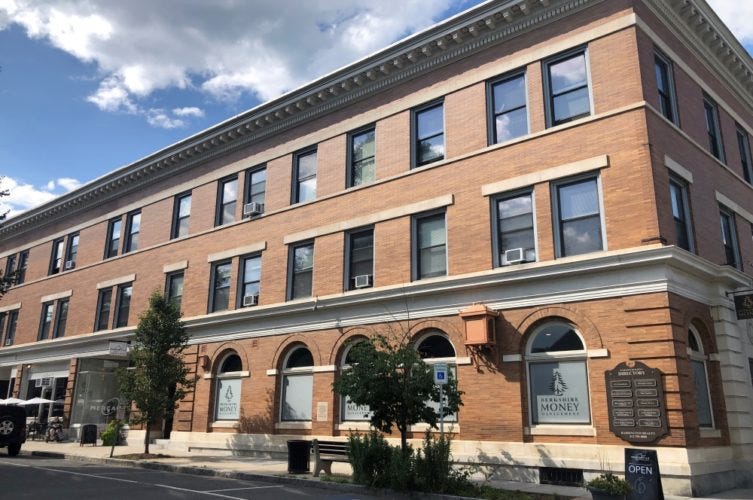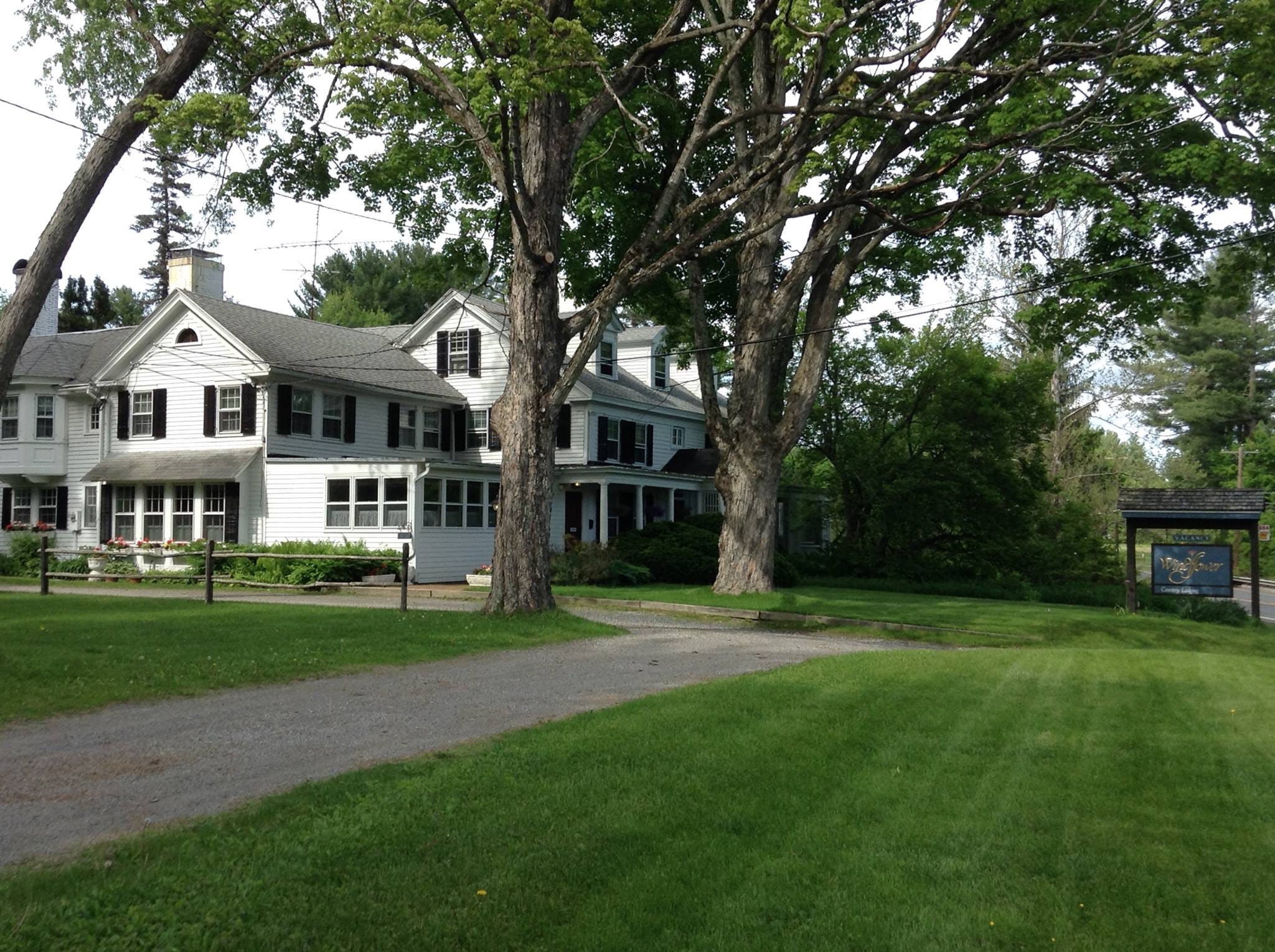ROUGH DRAFT: Quick hits of local housing news from a reporter's notebook
The Marble Block has been sold, but not to an affordable-housing organization, and other tidbits from a larger Argus story-in-progress.

∎ ∎ ∎
MARBLE BLOCK SOLD, BUT NOT TO CDCSB – The Marble Block, the historic downtown Great Barrington building that has housed the beloved Gorham & Norton package store for more than a century, was sold on May 18 to local developer and businessman Craig Barnum, according to a deed on file with the Southern Berkshire Register of Deeds and a related corporate filing made in late April with the Secretary of the Commonwealth’s Corporations Division. The sale price was $1.9 million, somewhat less than the listing price of $2.25 million.
Barnum, who owns other properties in Great Barrington including The Cove bowling alley on Route 7, and has been involved in various redevelopment projects across the region, did not immediately respond to a phone call and text message seeking comment about his plans for the occupied building. In addition to six ground-floor retail units, the property includes eight residential one- and two-bedroom apartments at what are considered to be affordable rents.
Last December, the Community Development Corporation of South Berkshire (CDCSB) announced that it had the building under contract. The affordable-housing and local-business-development organization, which recently spearheaded construction of the 49-unit Windrush Commons affordable-housing development, said its purchase would preserve the “naturally occurring affordable housing” long offered in the building.
To help make the deal happen – and pay for upgrades and stabilize rents – the Town of Great Barrington awarded CDCSB $500,000 from the community’s allocation of American Rescue Plan Act (ARPA) funds and another $100,000 in town funds from its Affordable Housing Trust (AHT). In exchange, CDCSB made a commitment to preserve at least four of the building’s apartments for residents earning no more than 65 percent of area-median income (AMI) at commensurate rents. That requirement would last for 20 years. But CDCSB did not complete the purchase.
According to Great Barrington Town Manager Mark Pruhenski, the town has been in discussions with CDCSB about redirecting the ARPA and AHT funds for another purchase meant to preserve affordable downtown housing, as the community struggles to solve significant, ongoing housing challenges. High prices for both rentals and home purchases have squeezed workers, in particular, who face difficulty paying for housing costs in the community where they live.
“We’ve been in conversation with [CDCSB] about offering the same or a similar amount of funding for another project they currently have in the works,” Pruhenski told me in an email. He noted that similar restrictions would apply. “Any use of ARPA funds for housing projects are required to remain at 65 perent AMI or less,” he said.
According to minutes of a December 2022 Affordable Housing Trust meeting, that committee’s grant of $100,000 was restricted to the possible Marble Block purchase, and would need to be re-authorized by the AHT board if used elsewhere.
Other downtown buildings, including the Mahaiwe Block, are being converted to upscale apartments fetching rents up to $3,500 per month, so the town and local housing organizations are seeking opportunities to protect existing housing that can remain affordable for local workers and families.
Barnum is also the owner of the former “Wonderful Things” property, also on Route 7. It once contained what could be considered naturally occuring affordable housing, but it was in horrific, unsanitary, and unsafe condition, even before a 2021 fire, that raised serious concerns among town health officials while it was occupied. Barnum has since torn it down with an eye on redeveloping the parcel.
For those who love a lunchtime sandwich and the other offerings at Gorham & Norton, fear not: John P. Tracy, the proprietor, with his wife Diane – and until last week part-owner of the building – told me that he has no plans to do anything differently. “We have a favorable lease until the end of the year and then we’ll renegotiate, so we’ll be here for a little bit,” he said. At 66, he has no immediate plans to retire. “But it’s going to happen someday,” he joked.
As for Barnum’s plans for the Marble Block and its residential tenants, Tracy said, “I know he's going to keep stable rents and affordable rents, and is not displacing anybody. So that’s a good thing.” He said the prior discussions with CDCSB ended because of price. “They wanted a big chunk of change off the listing price, and that wasn’t going to happen,” he said.
WINDRUSH COMMONS MOVE-IN – The aforementioned 49-unit Windrush Commons development will see tenants moving into their new apartments on South Main Street in the coming weeks, according to CDCSB Executive Director Carol Bosco Baumann. A formal ribbon-cutting will follow later in June, she told me.
According to Berkshire Housing’s Occupancy and Compliance Manager, Kristin Coyne, a majority of units in the five-building, multi-family complex will be occupied by households that work in Berkshire County, though she doesn’t yet have specific counts. “Everyone from indivduals, couples, roommates, to families with children all have been offered housing,” she told me in an email. Some of the new residents work in South County “but have been commuting from outlying towns and cities to Great Barrington, as up until now they couldn’t afford market-rate housing in Great Barrington,” she said.
Ten of the new units will be occupied by households that were considered homeless. “This means that several of our new residents were living in shelters, doubled up with family, or bouncing from place to place, and will now have safe and affordable stable homes,” Coyne explained.
FUNDS DENIED FOR ALANDER DOWNTOWN PROJECT – Voters at Great Barrington’s annual town meeting earlier this month rejected the recommendation of its Community Preservation Committee (CPC) to grant a total of $400,000 to developer Ian Rasch’s Alander Group. Of that, $250,000 was to underwrite the cost of offering two units at affordable rents in the soon-to-be renovated Mahaiwe Block, acquired by Alander last fall. The two units would be offered as affordable for those earning no more than 80 percent of AMI for 10 years.
At the May 1 town meeting, Rasch argued – as he did during my conversations with him for THE DEVELOPER series last fall – that “it’s a disgrace” to segregate affordable housing in developments like Windrush, though he previously told me, “That's better than nothing, for sure, but it doesn't really solve the long-term problem.”
Answering questions at town meeting, he decried the split between what he said was “rich-people housing and poor-people housing.” His view is that mixed-income downtown housing is better for the community and would help advance “an economically resilient, mixed-income, walkable downtown,” as he told me last fall. Rasch has long argued that investing public funds to underwrite affordable units in his buildings makes sense when considering costs and timelines for new affordable-housing construction, and even though he’s a private, for-profit developer.
Still, voters said no to the proposal, unconvinced that public funds should go to a private developer and concerned that the 10-year timeframe was too short.
When completed in late 2024, the renovated Mahaiwe Block will contain 22 studio and one-bedroom apartments. In the meantime, the building has sat vacant since tenants of a dozen apartments were displaced by the purchase last October. Rasch helped at least a few tenants relocate to nearby apartments and agreed to pay some rent and other expenses for a period.

Voters rejected a separate proposal to award $150,000 toward historic-restoration work on the Mahaiwe, which was built in 1905 and designed by renowned local architect Joseph McArthur Vance. Residents may have still been smarting from a prior allocation: Last June, they approved $250,000 for similar restoration work at Alander’s 343 Main project, but that grant soon became controversial. At the time of the vote, residents were told the building was being renovated to house a number of health-and-wellness and workforce-training nonprofits. Instead, Rasch changed his plans, and the building is now being redeveloped into 13 upscale residential apartments. (The CPC reaffirmed its grant of those historic-restoration funds after a public meeting with Rasch last November.)
Rasch’s mixed-use development projects, which also include 47 Railroad Street, rely largely on a combination of bank financing and private-equity investment. 343 Main Street also received $500,000 from the state’s Underutilized Properties Program.
Last fall, Rasch committed to reserving 20 percent of new units in both 343 Main and the Mahaiwe Block at some level of affordability, with rents reduced for those earning between 60 percent and 120 percent of area-median income. With or without public funds, he said he’d consider other funding mechanisms, including creation of a separate, lower-yield investment fund from his private-equity investors to make up the revenue difference.
CONSTRUCT’S WINDFLOWER WORKFORCE HOUSING IS NEAR CAPACITY – Construct’s Leigh Davis, who also serves on the Great Barrington Selectboard and chairs a joint Selectboard-Planning Board housing subcommittee, told me that things are proceeding as planned on the organization’s innovative project at the former Windflower Inn on Route 23 near the Egremont border.

Acquired by Construct on December 1, 2022, following the work and enthusiasm of local restaurateur Josh Irwin to identify opportunities for rapid development of workforce housing, Construct offers 13 “ensuite” rental units at the former inn. Davis told me that 12 units currently include “a range of occupants from hospitality workers to retirees on fixed incomes.” They’re not tied to a one-year lease, she said, and can stay as long as they continue to pay the monthly fee in advance.
Davis pointed to Windflower as “a blueprint for other entities” seeking creative solutions to workforce-housing challenges and serves, she said, as a model of “quick response” compared to new construction, for example. “Many say we can’t build our way out of the housing crisis,” she said, and Windflower “addresses the need for essential workers to live close to their work.”
Of the 13 units, five are reserved for those making no more than 65 percent of area-median income and rent is $800/mo. Five other units rent at $875 and three at $950, Davis said.
Still in the works, she said, is a commercial kitchen “that can be rented out for food processing and training.” She suggested it will be helpful to local food-service workers who “often have to travel to Springfield to get necessary certifications.”
∎ ∎ ∎





